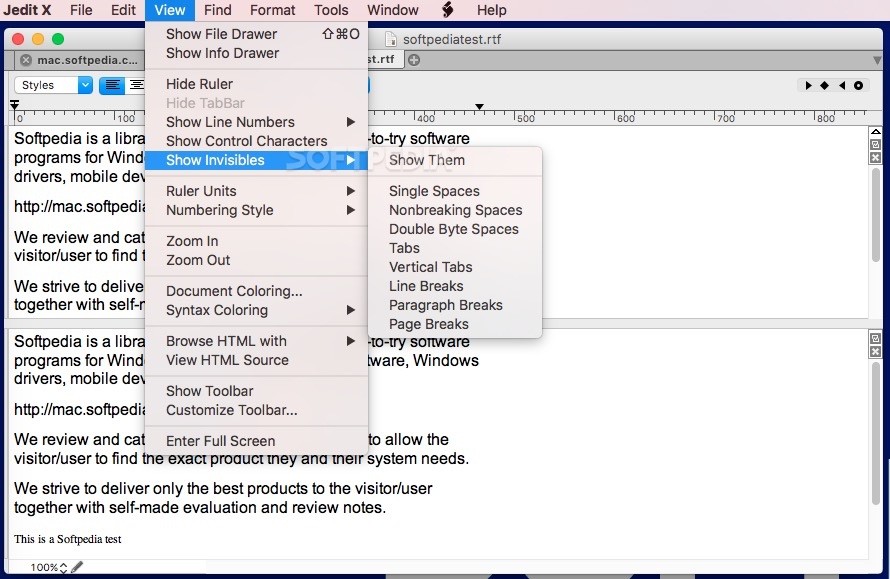Jedit X For Mac
As a developer, one of the tools that makes me more productive is a good text editor. While IDE environments are replete with a wide assortment of powerful editing tools, they often miss the mark on macro customization, binary (hex) viewers and the ability to edit large text files. More recently, my favorite IDE has been reminding me that text files outside my current project are being edited – which is an extreme nuisance. Fortunately, jEdit provides a wealth of text editing capability coupled with a competent BeanShell macro language.
Unfortunately, on Mac OS these capabilities come at a cost – jEdit has historically been a tad fickle to configure for the Mac keyboard bindings. As luck would have it, jEdit 5.2 and later has simplified the keyboard configuration for Mac dramatically.
The main issue is getting support for the Alt key, which Mac users press in combination with arrow keys for document navigation. While jEdit includes a Mac OS X keyboard map, one additional step is required to make this work with the Alt key.
To setup jEdit on Mac with sane keyboard bindings the first step is to modify your startup BeanShell script. Copy the default startup.bsh script from /Applications/jEdit.app/Contents/Java/startup to ~/Library/jEdit/startup.
Edit this file and add the following entries to the end:
Some of jEdit's features include: Written in Java, so it runs on Mac OS X, OS/2, Unix, VMS and Windows. Built-in macro language; extensible plugin architecture. Hundreds of macros and plugins available. Supports both Classic OS and Mac OS X, AppleScript, Multi-Style, Split Editing Window, Multiple Undo, HTML Coloring, Sherlock FCB Search, Book Marking, Paragraph Formatting, Object Embedding. Virtual breadboard full cracked antivirus.
Launch jEdit and select Utilities / Global Options. Under the jEdit group select “Shortcuts” and change the keymap selection to “Mac OS X”.
That’s it. Open a text file for editing and try some of the standard Mac OS key navigation sequences:
| Command + Arrow Right | Move to the end of a line |
| Alt + Arrow Right | Advance one word to the right |
There are other combinations as well, but these give you a good starting point to confirm your setup. Obviously, if you are running jEdit on other platforms (Windows / Linux) you will want to use the keymap that matches your environment best.

Java Runtime version 1.6 (aka Java 6) or later is required for jEdit 4.4 and later.
Java Runtime version 1.7 (aka Java 7) or later is required for jEdit 5.2 and later.
Java Runtime version 1.8 (aka Java 8) or later is required for jEdit 5.4 and later.
Java Runtime version 11 (aka Java 11) or later is required for jEdit 5.6 and later.
Before installing jEdit, make sure you have a compatible Java virtual machine; see the compatibility page for details.
Option 1 - manual download and install on any OS
| Stable version: jEdit 5.6.0 Changes | |||
| Download: | Java-based installer | 3.7 MiB | (For any operating system) |
| Windows Installer | 4.8 MiB | ||
| OS X package | 5.5 MiB | ||
| Debian package | 4.9 MiB | ||
| Slackware package | 4.9 MiB | ||
| User's guide | 0.6 MiB | (PDF with A4 paper, 149 pages) | |
| User's guide | 0.6 MiB | (PDF with US letter paper, 159 pages) | |
| Source code | 2.5 MiB | ||
| Daily Builds: jEdit 5.7pre1 (development trunk) Changes | |||
| Download: | Daily Builds | ||
Note: the above links are not to the files themselves, but ratherto pages where you can select a download mirror. Do not use yourbrowser's 'Download Link' command on the above links.
Jedit X For Mac High Sierra
Installation instructions are available for the following operating systems:
Using the Java-based installer
If you would like to write installation instructions for a platformnot listed here, e-mail me.Option 2 - easy install on some flavors of *nix
- FreeBSD users can find install jEdit from the ports collection by running:
- Gentoo Linuxusers can install jEdit from the portage tree by running
emerge jedit. - To install jEdit via Debian Linux
apt-get(this is also for any Debian based Distros like Ubuntu),add the following line to your/etc/apt/sources.list:e. g.Then, just run
apt-get update, followed byapt-get install jedit.The repository is now also secured and signed. To verify the packagesyou have to install the public key with which the repository is signed.This can be done by invoking
apt-key adv --keyserver keyserver.ubuntu.com --recv-keys E6A233DBE3AFBEFCIf you prefer manual installation of .deb files you can also download theDebian packagemanually.
- If you use apt4rpm, urpmi, or a similar tool with an RPM-based Linuxdistribution,you can automatically stay up to date with the latest version of jEditusing the JPackage RPM repository.